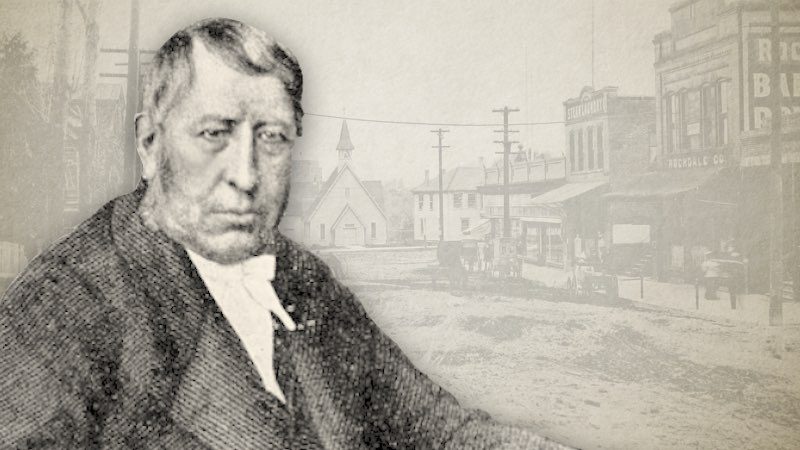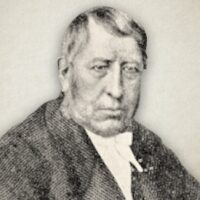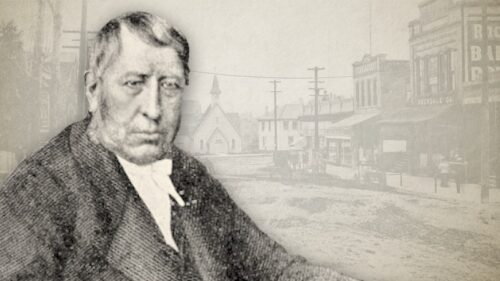
Introduction
John Kershaw (1792-1870) was pastor for fifty-two years of Hope Chapel, Rochdale. He exercised a powerful ministry among his flock, and became an influential preacher across the country. Few ministers remain faithful to a single congregation for an extended period—Kershaw committed himself to the same church he attended as a boy. His autobiography, “Memorials of the Mercies of a Covenant God while Traveling through the Wilderness”, is one of the best written of its genre. The following excerpt from this book (third edition) is selected in order to highlight the joy of those that sat under his ministry.
Lines to the Memory of Mr. Kershaw, Fifty-Two Years Pastor of the Church at Hope Chapel, Rochdale, Who Died on the 11th January, 1870, in the 78th Year of His Age.
“A Sinner Saved By Grace”
Robe in black weeds, ye Rochdale saints,
Pour out your wail in sore complaints;
Let sorrow trickle from your eyes,
And ease your hearts in sobs and sighs.
Your comforter, your joy is fled!
Your Pastor s gone,—JOHN KERSHAW’S dead.
Full many heav’nly blasts he blew,
With Gospel trumpet, sound and true;
And many hearts made glad, through grace,
While sobs and tears besmear’d each face.
But now, alas! the times are sad;
His work is done,—JOHN KERSHAW’S dead.
How oft he sobb’d and sigh’d in turn,
While seeking, on a Lord’s day morn,
For food to feed the weary saints,
For well he knew their sore complaints.
But, now, from anxious cares he’s freed;
His soul’s at rest,—JOHN KERSHAW’S dead.
While handling those memorials dear,
Those symbols rich, the saints to cheer,
The Bread, the Wine, that feast of grace,
How love has shone on his dear face;
But now to brighter worlds he’s sped,
And left us here;—JOHN KERSHAW’S dead.
When sin besmear’d the church’s pride,
How John his honest face would hide,
And sigh, and mourn a brother’s fall,
And pray for one who grieved them all;
Seek to restore, and grace would plead,
And weep, and love; but now HE’S dead.
How fond to hear the stamm’rer’s tongue,
In infant, aged, feeble, strong.
If John saw roots, the case was his;
He knew that sighs would turn to praise.
He sought to feed with living Bread,
But now it’s past;—JOHN KERSHAW’S dead.
A hearty friend to God’s own poor;
Would carry bread from door to door.
Was cheerful in affliction s cell;
Soothing the sick, sweet truths would tell.
His kindly visits now are fled,
Alas! He’s gone;—JOHN KERSHAW’S dead.
If John a favour would obtain,
The church’s voice he soon could gain
By signs and look, which well they knew,
His logic powerful, strong, and true.
“Come, my dear friends,” then stroke his head;
The case was won;—but now HE’S dead.
In days of health how pleased he stood
Before the saints, in cheerful mood;
Declaring how the Lamb was slain,
Till pews and gall’ries rang again.
While holy raptures raised that head
That’s now laid low. Ah, me! HE’S dead.
When wading deep in Gospel tides,
His hands he’d prop against his sides;
And when his faith reach’d o’er the ford,
How dust would fly from Bible board.
Elated saint! The truth he spread
Both far and near; but now HE’S dead.
Full many quaint good tales he told
Of things well cast in Gospel mould;
While peace sat brooding on his face,
And heart right full of mirth and grace.
And many a trickling tear he shed
O’re subjects sweet;—but now HE’S dead.
Dead! Yes, but still he lives to God,
Bought with atoning, precious blood,
And, mingling with the ransom’d choir,
Each vying note still rising higher.
That state eternal pleasure gives;
There our late friend, JOHN KERSHAW, lives.
John Kershaw (1792-1870) was a Strict and Particular Baptist preacher. He was appointed the Pastor of Hope Chapel, Rochdale, serving this position for fifty-three years. John Hazelton wrote of him:
“His autobiography is one of the best books of its kind and one striking incident we will quote. It is his account of his interview in Edinburgh with Dr. John Duncan, often called "Rabbi" Duncan, because of his profound knowledge of Hebrew. Dr. Duncan (1796-1870) was Professor of Hebrew in New College, Edinburgh, and was a man of the most acute and profound intellectual powers, and at the same time a deeply spiritual and Scriptural preacher. In learning and associations he was at the antipodes of plain John Kershaw. In November, 1861, Mr. Kershaw preached in Edinburgh, arrangements having been made through Lady Lucy Smith, who was desirous that his original and powerful ministry should be exercised there. He writes:—"Another of my visitors was Dr. Duncan, who I was told by one of the ministers understood fourteen languages and that there was only one in the City who surpassed him in learning. He told me he had heard me preach three sermons, and he quite agreed with me in every statement that I had made, both in doctrine, experience and practice, save one, and that I had not fully entered upon, namely, 'the extent of the call of the gospel.' He candidly told me that his human learning had for years past been a great hindrance to his coming to a saving knowledge of the truth, and he had proved Paul's words, that the world by wisdom knew not God; and referring me to 1 Cor. 1:21,22 said he was for a long time like a wandering star or a ship at sea without a compass, ready to settle in every 'ism'—sometimes Arianism or Socinianism; and sometimes his mind was bordering upon infidelity. He declared himself much ashamed of many of his theological productions. When it pleased the Lord to work in his soul by the power of the Spirit he was for a long time in a distressed state, not knowing what to do to get peace and comfort. A conversation with another minister was made useful to him and he was enabled to go to the feet of Jesus as a little child and beg Him to teach him, a poor ignorant sinner, by His Spirit and His Word. The Lord graciously heard prayer and revealed Himself as his Saviour and Redeemer. We spoke of Scott's 'Force of Truth,' in which the author confessed he had been priding himself on his human attainments, opposing the doctrines of grace, and despising his neighbour, that dear man of God, John Newton, who eventually was made a blessing to him; also of John Berridge, who preached some years before the Lord stripped him and caused him to flee to Jesus for refuge. The conversation I had with this man I hope never to forget."
John Kershaw Sermons




